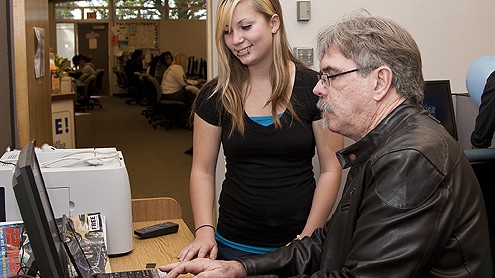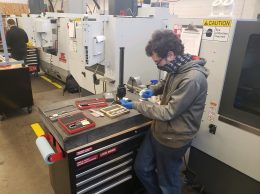
Allan Hancock College students Angie Swiderski and Lee Irwin work on a presentation to show at the grand opening of the school’s new entrepreneurship center about the value of small-business classes. (courtesy photo)
Santa Maria may soon be home to a full-fledged small-business incubator.
Allan Hancock College officially opened its entrepreneurship center last month. School officials say they hope the program is the first step toward making the college Santa Maria’s first real hub for businesspeople and students.
Anne Cremarosa, the center’s director, said its goal is to send entrepreneurs into the community with a two-year business degree. Though some students may transfer to a four-year university, Cremarosa said she wants the community college program to provide the essential tools to run a business.
“We knew a lot of our students had the desire to own businesses, but we didn’t have programs that taught them any more than little tidbits on how to run a business. Little tidbits aren’t enough,” Cremarosa said. “With the new center, we have a two-prong approach. It has an academic, educational side and an entrepreneurship center that provides resources.”
Dave Cross, director of Santa Maria’s economic development commission, told the Business Times that entrepreneurship is essential to the city’s economy. He’s been involved in planning the Hancock small-business center since the idea sprouted about four years ago.
Before that, Cross ran a small-business incubator in the Santa Maria Town Center, but it closed due to lack of funding. The city has not always had a strong focus on small-business development, but Cross said that’s changing because there’s a demand for it. “Hancock has really stepped up, and that’s a great advantage to our region,” Cross said.
Santa Maria, Santa Barbara County’s most populous city, is home to a number of small businesses. About 70 percent of companies in the city have 10 employees or less, Cross said, which makes it important to nurture both business owners and their employees.
“Sometimes, especially with the economy the way it is, one of the only options for people is to start their own business,” Cross said. “Usually, people have no idea just how much work it takes to run a successful business. What the center does is provide an opportunity for entrepreneurs to go in on the ground floor and learn and see whether they want to invest the time and effort necessary to get started.”
Allan Hancock held a grand opening for the center Feb. 22, capping four years of progress. The school has offered classes in small business for three semesters. Cremarosa said the idea for the center came about when faculty members noticed that students were learning technical skills, but they didn’t know how to put them to use in a business.
Welding, applied arts and food services instructors started setting aside a few lab hours each week for students to meet with small-business consultants. Cremarosa said the center has already hosted attorneys, certified public accountants and bankers who talked to students about legal issues, financial planning and Small Business Administration Loans.
One of the program’s classes is called New Venture Laboratory. By the end of the semester, Cremarosa said, students in the lab will have developed product ideas and done market research. “At the end of the semester, the students will make presentations to investors. There are some great ideas, and I fully expect something to move forward by the end of the end of the semester,” she said.
Though Cremarosa declined to comment on specific business ideas because the students haven’t yet secured patents, she said she polled her entrepreneurship students about the types of companies they want to start. Some of them want to start retail and designer clothing companies, while others are interested in food services and others want to start sports-related businesses.
Cremarosa said the center has grant money that will keep it going for a minimum of three years, and she hopes that it will eventually expand. “Studies and history have shown that entrepreneurship is what helps bring the economy back up. We know there are a lot of small-business folks who want to serve the community,” she said. “We do want to eventually become an incubator. Right now, we’re limited, but there’s hope. I’ve been getting very strong responses.”
And Santa Maria has a history of sprouting successful small companies that go big, Cross said. Prince Lionheart, a baby product company that started out of a Santa Maria garage in 1973, has developed into an international manufacturing company that sells to Target and Walmart. “You never know when you’re going to get a diamond,” Cross said.






 Print
Print Email
Email

















